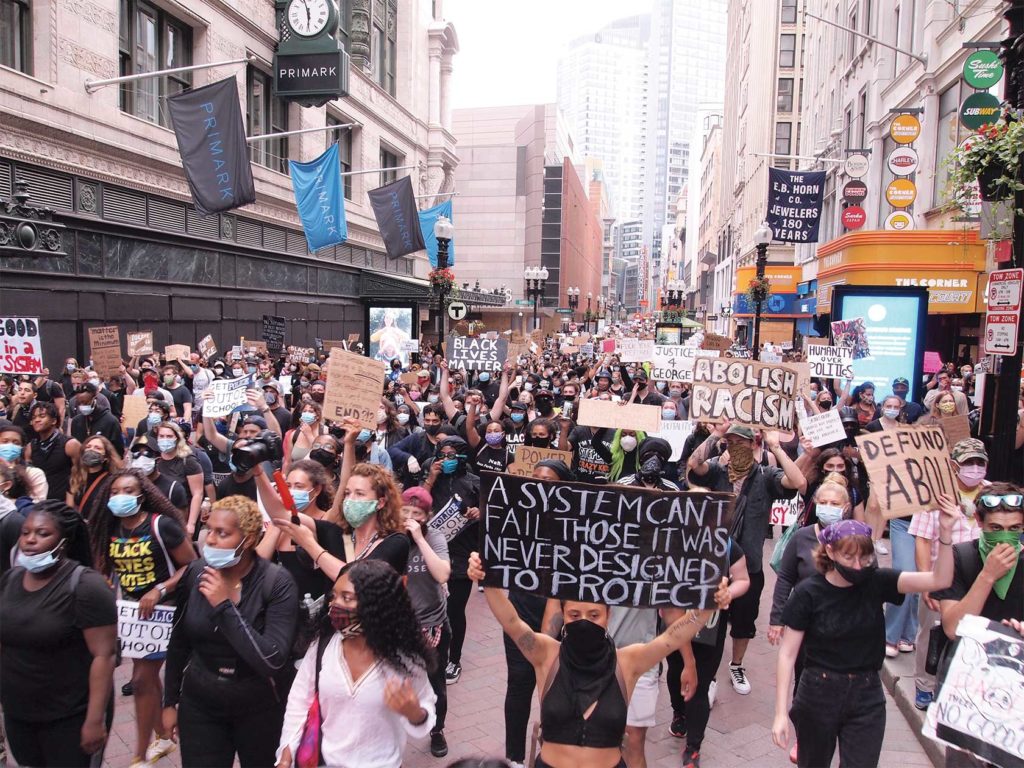Mayor, activists differ on call to cut police budget
Activists seeking more funding for youth services

The youth protestors who led a crowd of 2,000 to demonstrate in front of City Hall on Wednesday of last week made their demands clear: cut 10% of the $414 million police budget and invest the funding in youth development and violence prevention programs.
Their calls were echoed by city councilors and criminal justice reform activists, many of whom have long advocated for shifting funding from law enforcement to prevention.
By Friday, Mayor Martin Walsh delivered his response: an executive order declaring racism a public health crisis in Boston and a more modest 2.8% cut to the Boston Police Department’s budget, with most, but not all of the funds channeled to programs outside the department’s purview.
“Our goal is to recover from this pandemic in a more equitable state than we entered it,” said Walsh, who declared racism in Boston a public health emergency during the same announcement.
Monday, Walsh resubmitted the FY21 budget, which now reallocates $12 million from the BDP budget as follows: $4 million for the Boston Public Health Commission (BPHC), $2 million for community-based programs, $2 million for BEST Clinicians and mental health support housed at the BPD, $2 million to support minority- and women-owned businesses, and $2 million for housing support and youth homelessness.
The youth activists who organized last week’s march on City Hall are calling for more than $41 million of the police budget to be channeled into youth jobs, mental health counselors and social-emotional supports in the Boston Public Schools and violence prevention programs.
District 4 City Councilor Andrea Campbell told WGBH she is in favor of transferring all $60 million in police overtime funding to community-based organizations that are working to alleviate the root causes of violence in Boston.
“When thousands are mobilizing to demand our city finally implement reforms to address racism and racial inequities in our systems, city leadership needs to listen and take action,” Campbell said in response to the mayor’s order. In addition to reallocation of the police budget, Campbell’s police reform plans have called for full implementation of body cameras, removal of police from public schools and expansion of diversity within the BPD.
District 5 Councilor Ricardo Arroyo, who in March proposed an ordinance declaring racism in Boston a public health crisis, said the city needs to change the way it approaches public safety by investing more in prevention.
“I see this moment as a call to reassess how we do things,” he said. “We’re putting lots of money into addressing the symptoms of a problem without putting money into addressing the causes.”
Arroyo said the council was inundated with calls for defunding the police department. His office alone received more than 13,000 emails and scores of phone calls prior to a June 6 council hearing during which dozens of Boston residents testified in favor of cutting the police budget.
Walsh also announced a nine-member Boston Police Reform Task Force chaired by former U.S. Attorney Wayne Budd, which he said will develop recommendations within 60 days. Walsh pledged to announce reforms to the police department within 90 days.
The task force will be responsible for reviewing the department’s use of force policies, improving the partially-implemented body-worn camera program and reforming the Community Ombudsman Oversight Panel, or CO-OP Board, which reviews police investigations of misconduct after they’ve been completed by the department’s Internal Affairs Division. Walsh has rejected calls for an independent civilian review board empowered to conduct its own investigations of misconduct.
The mayor, who has received more than $400,000 in campaign contributions from police officers over his seven years in office, underscored his faith in the department’s ability to combat violence in Boston.
“Our officers, they are truly committed to community policing, and positive reform,” he said during a press briefing, adding that officers have taken at least 5,000 guns off the streets in the past six years.
Walsh also said that relationships between police and youth are bettered by programs the city has initiated. Police stops, however, are known to be heavily skewed toward blacks On Friday WGBH released an analysis of police data showing 70 percent police stops recorded in their Field Interrogation and Observation database were of blacks.
At last week’s youth protest, organizers Vikiana Petit-Homme and Stephen Lafume said they expected a “resounding yes” from city councilors on their proposal to cut 10% of the BPD’s overall budget ($41 million).
“I feel like the biggest obstacle is really just getting the mayor to say yes … To convince the mayor. And hopefully he makes the right decision,” Lafume said. Their youth collective, For The People Boston, has invited Walsh to a town hall meeting on June 17, but the mayor has not yet responded to their request.
The City Council is scheduled to vote on the mayor’s budget on June 24.






